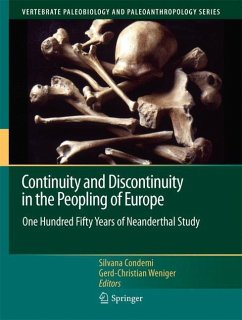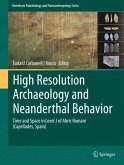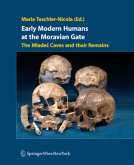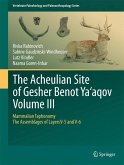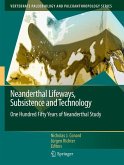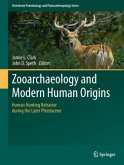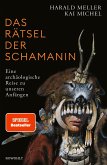Continuity and Discontinuity in the Peopling of Europe
One Hundred Fifty Years of Neanderthal Study
Herausgegeben:Condemi, Silvana; Weniger, Gerd-Christian
Continuity and Discontinuity in the Peopling of Europe
One Hundred Fifty Years of Neanderthal Study
Herausgegeben:Condemi, Silvana; Weniger, Gerd-Christian
- Gebundenes Buch
- Merkliste
- Auf die Merkliste
- Bewerten Bewerten
- Teilen
- Produkt teilen
- Produkterinnerung
- Produkterinnerung
Ever since we discovered the Neanderthals, debate has raged among palaeoanthropologists and archaeologists over their origin and significance. This book sets out the current status of our knowledge of them and suggests areas for potential future research.
Since the Western world first became aware of the existence of Neanderthals, this Pleistocene human has been a regular focus of interest among specialists and also among the general public. In fact, we know far more about Neanderthals than we do about any other extinct human population. Furthermore, over the past 150 years no other…mehr
![High Resolution Archaeology and Neanderthal Behavior High Resolution Archaeology and Neanderthal Behavior]() High Resolution Archaeology and Neanderthal Behavior40,99 €
High Resolution Archaeology and Neanderthal Behavior40,99 €![Early Modern Humans at the Moravian Gate Early Modern Humans at the Moravian Gate]() Maria Teschler-Nicola (ed.)Early Modern Humans at the Moravian Gate154,99 €
Maria Teschler-Nicola (ed.)Early Modern Humans at the Moravian Gate154,99 €![The Acheulian Site of Gesher Benot Ya¿aqov Volume III The Acheulian Site of Gesher Benot Ya¿aqov Volume III]() Rivka RabinovichThe Acheulian Site of Gesher Benot Ya¿aqov Volume III40,99 €
Rivka RabinovichThe Acheulian Site of Gesher Benot Ya¿aqov Volume III40,99 €![Neanderthal Lifeways, Subsistence and Technology Neanderthal Lifeways, Subsistence and Technology]() Neanderthal Lifeways, Subsistence and Technology97,99 €
Neanderthal Lifeways, Subsistence and Technology97,99 €![Zooarchaeology and Modern Human Origins Zooarchaeology and Modern Human Origins]() Zooarchaeology and Modern Human Origins77,99 €
Zooarchaeology and Modern Human Origins77,99 €![Das Rätsel der Schamanin Das Rätsel der Schamanin]() Harald MellerDas Rätsel der Schamanin28,00 €
Harald MellerDas Rätsel der Schamanin28,00 €![Water Civilization Water Civilization]() Water Civilization74,99 €
Water Civilization74,99 €-
-
-
Since the Western world first became aware of the existence of Neanderthals, this Pleistocene human has been a regular focus of interest among specialists and also among the general public. In fact, we know far more about Neanderthals than we do about any other extinct human population. Furthermore, over the past 150 years no other palaeospecies has been such a constant source of discussion and fierce debate among palaeoanthropologists and archaeologists. This book presents the status of our knowledge as well as the methods and techniques used to study this extinct population and it suggests perspectives for future research.
- Produktdetails
- Vertebrate Paleobiology and Paleoanthropology Series
- Verlag: Springer / Springer Netherlands
- Artikelnr. des Verlages: 80025750, 978-94-007-0491-6
- 2011
- Seitenzahl: 408
- Erscheinungstermin: 15. März 2011
- Englisch
- Abmessung: 285mm x 215mm x 30mm
- Gewicht: 1282g
- ISBN-13: 9789400704916
- ISBN-10: 9400704917
- Artikelnr.: 32068502
- Vertebrate Paleobiology and Paleoanthropology Series
- Verlag: Springer / Springer Netherlands
- Artikelnr. des Verlages: 80025750, 978-94-007-0491-6
- 2011
- Seitenzahl: 408
- Erscheinungstermin: 15. März 2011
- Englisch
- Abmessung: 285mm x 215mm x 30mm
- Gewicht: 1282g
- ISBN-13: 9789400704916
- ISBN-10: 9400704917
- Artikelnr.: 32068502
12. Computerized Reconstruction of Prenatal Growth Trajectories in the Dentition: Implications for the Taxonomic Status of Neandertals. - 13. Endostructural Characterisation of the Regourdou 1 Neanderthal Proximal Arm: Bilateral Asymmetry and Handedness. - 14. A Three-dimensional Lookat the Neanderthal Mandible. - 15. Integration and Homology of "Chignon" and "Hemibun" Morphology. - 16. Virtual Synthesis of the Skull in Neanderthals by FESS. - 17. Neandertal mtDNA from a Late Pleistocene Human Mandible from the Cova del Gegant (Spain). - 18. Towards Neanderthal Paleogenomics. - 19. Twelve Years of Neandertal Genetic Discoveries : State-of-the-art and Future Challenges. - 20. Radiocarbon Dating the Middle to Upper Palaeolithic Transition: the Demise of the Last Neanderthals and the First Appearance of Anatomically Modern Humans in Europe. - 21. Archaeological, Paleontological and Genomic Perspectives on Late European Neandertals at Vindija Cave, Croatia. - 22. Late Neandertals and Early Modern Humans in Europe: Population Dynamics and Paleobiology. - 23. Aliens from Outer Time? Why the "Human Revolution" Is Wrong, and Where Do We Go from Here? . - 24. Neandertals and the Roots of Human Recency. - 25. Epilogue 150 Years of Neanderthal
12. Computerized Reconstruction of Prenatal Growth Trajectories in the Dentition: Implications for the Taxonomic Status of Neandertals. - 13. Endostructural Characterisation of the Regourdou 1 Neanderthal Proximal Arm: Bilateral Asymmetry and Handedness. - 14. A Three-dimensional Lookat the Neanderthal Mandible. - 15. Integration and Homology of "Chignon" and "Hemibun" Morphology. - 16. Virtual Synthesis of the Skull in Neanderthals by FESS. - 17. Neandertal mtDNA from a Late Pleistocene Human Mandible from the Cova del Gegant (Spain). - 18. Towards Neanderthal Paleogenomics. - 19. Twelve Years of Neandertal Genetic Discoveries : State-of-the-art and Future Challenges. - 20. Radiocarbon Dating the Middle to Upper Palaeolithic Transition: the Demise of the Last Neanderthals and the First Appearance of Anatomically Modern Humans in Europe. - 21. Archaeological, Paleontological and Genomic Perspectives on Late European Neandertals at Vindija Cave, Croatia. - 22. Late Neandertals and Early Modern Humans in Europe: Population Dynamics and Paleobiology. - 23. Aliens from Outer Time? Why the "Human Revolution" Is Wrong, and Where Do We Go from Here? . - 24. Neandertals and the Roots of Human Recency. - 25. Epilogue 150 Years of Neanderthal

